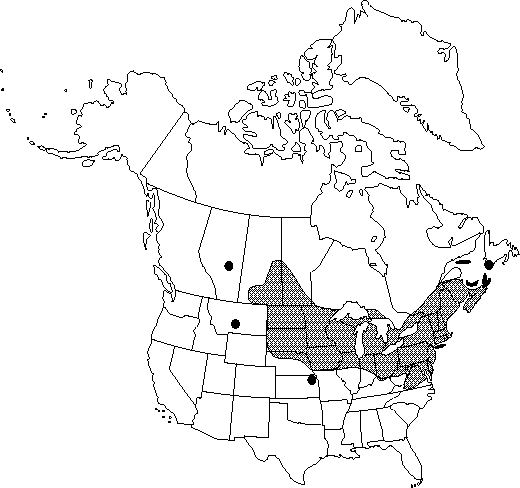Difference between revisions of "Humulus lupulus var. lupuloides"
Syst. Bot. 3: 63. 1978 Humulus americanus Nuttall.
FNA>Volume Importer |
imported>Volume Importer |
||
| (7 intermediate revisions by 2 users not shown) | |||
| Line 5: | Line 5: | ||
|title=Syst. Bot. | |title=Syst. Bot. | ||
|place=3: 63. 1978 Humulus americanus Nuttall | |place=3: 63. 1978 Humulus americanus Nuttall | ||
| + | }} | ||
| + | |special_status={{Treatment/ID/Special_status | ||
| + | |code=E | ||
| + | |label=Endemic | ||
}} | }} | ||
|basionyms= | |basionyms= | ||
| Line 10: | Line 14: | ||
|name=Humulus americanus | |name=Humulus americanus | ||
|authority=Nuttall | |authority=Nuttall | ||
| + | |rank=species | ||
}} | }} | ||
|hierarchy=Cannabaceae;Humulus;Humulus lupulus;Humulus lupulus var. lupuloides | |hierarchy=Cannabaceae;Humulus;Humulus lupulus;Humulus lupulus var. lupuloides | ||
| Line 18: | Line 23: | ||
}}<!-- | }}<!-- | ||
| − | --><span class="statement" id="st- | + | --><span class="statement" id="st-undefined" data-properties=""><b>Stems </b>relatively pubescent at nodes, usually more than 15 hairs per 0.1 sq. mm at most pubescent portion (excluding angle of petiole with stem). <b>Leaf</b> blades 10 cm or more usually having fewer than 5 lobes; smaller blades (ca. 5 cm) often with no more than 3 easily visible veins branching off midrib (excluding proximal branches); surfaces abaxially not conspicuously pubescent, usually fewer than 100 hairs per cm on length of medial midrib, more than 25 glands per 10 sq. mm between veins, hairs usually absent between veins.</span><!-- |
-->{{Treatment/Body | -->{{Treatment/Body | ||
|habitat=Moist thickets, woods, riverbanks | |habitat=Moist thickets, woods, riverbanks | ||
|elevation=0-2000 m | |elevation=0-2000 m | ||
| − | |distribution=Alta.;Man.;N.B.;Nfld.;N.S.;Ont.;P.E.I.;Que.;Sask.;Conn.;Del.;Ill.;Ind.;Iowa;Kans.;Ky.;Maine;Md.;Mass.;Mich.;Minn.;Mont.;Nebr.;N.H.;N.J.;N.Y.;N.Dak.;Ohio;Pa.;R.I.;S.Dak.;Vt.;Va.;W.Va.;Wis. | + | |distribution=Alta.;Man.;N.B.;Nfld. and Labr. (Nfld.);N.S.;Ont.;P.E.I.;Que.;Sask.;Conn.;Del.;Ill.;Ind.;Iowa;Kans.;Ky.;Maine;Md.;Mass.;Mich.;Minn.;Mont.;Nebr.;N.H.;N.J.;N.Y.;N.Dak.;Ohio;Pa.;R.I.;S.Dak.;Vt.;Va.;W.Va.;Wis. |
| − | |discussion=<p>Humulus lupulus var. lupuloides, defined as an intermediate, encompasses plants not falling into the other three varieties occurring in North America that are much more distinctive. It intergrades where it is sympatric with the introduced H. lupulus var. lupulus in southern Ontario, southern Quebec, and northeastern United States; with H. lupulus var. pubescens in midwestern United States; and with H. lupulus var. neomexicanus in the southern Canadian prairies and the Dakotas.</p> | + | |discussion=<p><i>Humulus lupulus </i>var.<i> lupuloides</i>, defined as an intermediate, encompasses plants not falling into the other three varieties occurring in North America that are much more distinctive. It intergrades where it is sympatric with the introduced <i>H. lupulus </i>var.<i> lupulus</i> in southern Ontario, southern Quebec, and northeastern United States; with <i>H. lupulus </i>var.<i> pubescens</i> in midwestern United States; and with <i>H. lupulus </i>var.<i> neomexicanus</i> in the southern Canadian prairies and the Dakotas.</p> |
|tables= | |tables= | ||
|references= | |references= | ||
| Line 33: | Line 38: | ||
-->{{#Taxon: | -->{{#Taxon: | ||
name=Humulus lupulus var. lupuloides | name=Humulus lupulus var. lupuloides | ||
| − | |||
|authority=E. Small | |authority=E. Small | ||
|rank=variety | |rank=variety | ||
| Line 42: | Line 46: | ||
|habitat=Moist thickets, woods, riverbanks | |habitat=Moist thickets, woods, riverbanks | ||
|elevation=0-2000 m | |elevation=0-2000 m | ||
| − | |distribution=Alta.;Man.;N.B.;Nfld.;N.S.;Ont.;P.E.I.;Que.;Sask.;Conn.;Del.;Ill.;Ind.;Iowa;Kans.;Ky.;Maine;Md.;Mass.;Mich.;Minn.;Mont.;Nebr.;N.H.;N.J.;N.Y.;N.Dak.;Ohio;Pa.;R.I.;S.Dak.;Vt.;Va.;W.Va.;Wis. | + | |distribution=Alta.;Man.;N.B.;Nfld. and Labr. (Nfld.);N.S.;Ont.;P.E.I.;Que.;Sask.;Conn.;Del.;Ill.;Ind.;Iowa;Kans.;Ky.;Maine;Md.;Mass.;Mich.;Minn.;Mont.;Nebr.;N.H.;N.J.;N.Y.;N.Dak.;Ohio;Pa.;R.I.;S.Dak.;Vt.;Va.;W.Va.;Wis. |
|reference=None | |reference=None | ||
|publication title=Syst. Bot. | |publication title=Syst. Bot. | ||
|publication year= | |publication year= | ||
| − | |special status= | + | |special status=Endemic |
| − | |source xml=https:// | + | |source xml=https://bitbucket.org/aafc-mbb/fna-data-curation/src/2e0870ddd59836b60bcf96646a41e87ea5a5943a/coarse_grained_fna_xml/V3/V3_963.xml |
|genus=Humulus | |genus=Humulus | ||
|species=Humulus lupulus | |species=Humulus lupulus | ||
|variety=Humulus lupulus var. lupuloides | |variety=Humulus lupulus var. lupuloides | ||
| − | |||
| − | |||
| − | |||
| − | |||
| − | |||
| − | |||
| − | |||
| − | |||
| − | |||
| − | |||
}}<!-- | }}<!-- | ||
-->[[Category:Treatment]][[Category:Humulus lupulus]] | -->[[Category:Treatment]][[Category:Humulus lupulus]] | ||
Latest revision as of 21:52, 5 November 2020
Stems relatively pubescent at nodes, usually more than 15 hairs per 0.1 sq. mm at most pubescent portion (excluding angle of petiole with stem). Leaf blades 10 cm or more usually having fewer than 5 lobes; smaller blades (ca. 5 cm) often with no more than 3 easily visible veins branching off midrib (excluding proximal branches); surfaces abaxially not conspicuously pubescent, usually fewer than 100 hairs per cm on length of medial midrib, more than 25 glands per 10 sq. mm between veins, hairs usually absent between veins.
Habitat: Moist thickets, woods, riverbanks
Elevation: 0-2000 m
Distribution

Alta., Man., N.B., Nfld. and Labr. (Nfld.), N.S., Ont., P.E.I., Que., Sask., Conn., Del., Ill., Ind., Iowa, Kans., Ky., Maine, Md., Mass., Mich., Minn., Mont., Nebr., N.H., N.J., N.Y., N.Dak., Ohio, Pa., R.I., S.Dak., Vt., Va., W.Va., Wis.
Discussion
Humulus lupulus var. lupuloides, defined as an intermediate, encompasses plants not falling into the other three varieties occurring in North America that are much more distinctive. It intergrades where it is sympatric with the introduced H. lupulus var. lupulus in southern Ontario, southern Quebec, and northeastern United States; with H. lupulus var. pubescens in midwestern United States; and with H. lupulus var. neomexicanus in the southern Canadian prairies and the Dakotas.
Selected References
None.